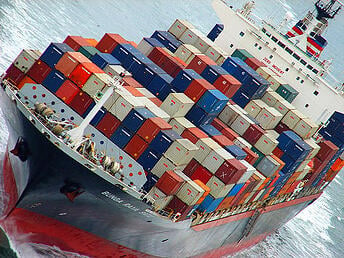 On Tuesday of this week, the world’s three largest container shipping carriers, Maersk, Mediterranean Shipping Co., and CMA CGM announced a long-term operational alliance on East-West trades, reported American Shipper (AS).
On Tuesday of this week, the world’s three largest container shipping carriers, Maersk, Mediterranean Shipping Co., and CMA CGM announced a long-term operational alliance on East-West trades, reported American Shipper (AS).
The three giant container shipping carriers have named this operational alliance the “P3 Network”.
The AS article quoted Vincent Clerc, chief trade and marketing officer for Maersk as saying P3 stands for “project three”. According to Clerc, the name was something they were calling this alliance plan to begin with and it simply stuck.
In my mind, it makes more sense for P3 to stand for “powerful 3”.
The 3 largest, most powerful carriers are combining their fleets and management of them for the Asia – Europe, transpacific, and transatlantic shipping routes.
The best word I can come up with to describe this alliance is triumvirate.
In theory, and often on paper, all parties are equal in a triumvirate. That’s theory. In practice, the three powerful parties that align in a triumvirate are rarely, if ever, equal. In the case of the P3 triumvirate, it is no different.
With megaships, especially those held by Maersk, hitting the waters and these three carriers bringing different capacity amounts to these shipping routes, it seems unlikely the shared power in this alliance would be split into even thirds.
AS reports that Maersk brings ships with 1.1 million TEUs, or 42 percent of the P3 Alliance capacity, to the table; MSC contributes 900,000 TEUs or 34 percent of the capacity; and CMA CGM about 600,000 TEUs or 24 percent of the capacity.
The most famous triumvirates in history served a purpose and then quickly fell apart with one member left standing.
Think about those famous triumvirates of Rome. With the First Triumvirate, consisting of Julius Caesar, Pompeius Magnus (“Pompey”), and Marcus Crassus, Crassus died and Caesar and Pompey went into civil war until Caesar defeated Pompey.

Of course, this alliance of container shipping carriers is not a political alliance to gain control of a country or region. They certainly could have a long long-term alliance as their announcement states.
The three largest carriers governing their ships together is much more likely to lead to smaller container shipping carriers getting swallowed up.
But if many of the smaller carriers failed to compete and stay viable against the P3 Network, is it possible the triumviri would turn on each other, have a complete merging, or a buyout?
In December of 2011, we posted a blog here on the Universal Cargo Management website about Maersk poising to outlast competitors. 2011, in the midst of overcapacity and freight rates being pushed down to low levels, was a rough year for container shipping carriers creating losses in the billions of dollars.
Carriers have managed to push freight rates and profits back up since then, but they have still been going through some difficult times. It may end up being extremely difficult for some of the smaller carriers to compete and keep their lines open competing against the most powerful three carriers working together.
The big quote of that 2011 article was, “Maersk says it is prepared to outlast its rivals.” Joining its top two rivals is probably the better strategy than simply sitting around trying to outlast.
It’s also not as though these carriers have not partnered together in different ways over the years, but nothing to the extent of this planned network.
The AS article reports, “The three carriers [Maersk, Mediterranean Shipping Co., and CMA CGM] hope to begin operation of the network in the second quarter of next year, subject to obtaining the approval of relevant competition and other regulatory authorities.”
This union of carriers could create more stability in freight rates over these East-West trade routes as well as make it easier for the powerful three to push freight rates higher as they would be able to better control capacity.
How would the smaller carriers react to the P3 Network? Trying to drop ocean freight rates under the P3 Network’s would be difficult. Surely, the largest container shipping carriers in the world could dip their prices under whatever the other carriers can and hold their prices there longer.
A freight rate bidding war would seem good to shippers for a while as it would mean lower freight rates, but only for a while. It would be terribly difficult for carriers to stay afloat under such conditions. Then, with less carriers and competition, freight rates would shoot back up.
Perhaps the smaller carriers will work at increasing their alliances and form larger networks to avoid being all by themselves on waters traversed by such leviathans.
Still, that would shrink the number of parties competing with their own ocean freight rates too.
It will be interesting to see what happens in terms of “obtaining the approval of relevant competition and other regulatory authorities” and what kind of game changer this triumvirant could turn out to be.
What are your thoughts on this P3 Network? Share with us in the comments section below.
—
Source:
